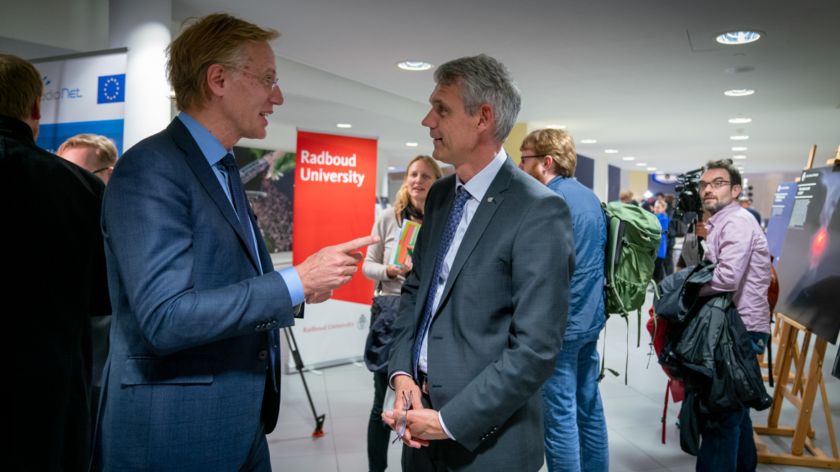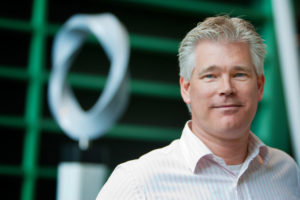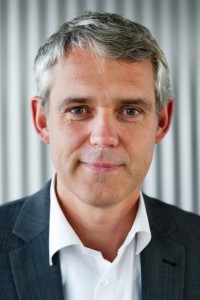Radboud scientists rather positive about Robbert Dijkgraaf, future Minister of Education
-
 Robbert Dijkgraaf (links) in gesprek met Heino Falcke bij de voorstelling van de foto van het zwarte gat in Brussel, 2019. Foto: Erik van 't Hullenaar
Robbert Dijkgraaf (links) in gesprek met Heino Falcke bij de voorstelling van de foto van het zwarte gat in Brussel, 2019. Foto: Erik van 't Hullenaar
Robbert Dijkgraaf is intended to be the next Minister of Higher Education. He succeeds Ingrid van Engelshoven, who also took place in the previous cabinet on behalf of D66. Scientists from Nijmegen are happy with the appointment of the top scientist in The Hague, but they remain cautious. ‘There's a lot of potential, but the execution remains to be seen.’
Next Monday the new Dutch cabinet will be inaugurated, including Robbert Dijkgraaf as Minister of Higher Education. Since 2012 the physicist was director of the Institute of Advanced Study in Princeton. In 2003 he won the Spinoza Prize. Three scientists and directors at Radboud University look towards his arrival.
Sijbrand de Jong, dean at the Faculty of Science:
‘The appointment of Robbert Dijkgraaf as Minister of Education is good news. Not because he is a scientist per se: Ronald Plasterk (Minister of Education on behalf of the PvdA from 2007 until 2010, ed.) was also a scientist and we are still recovering from his reign. But Dijkgraaf understands the Dutch research and educational system across the whole board well. I think his approach will be very nuanced.’
‘My vision may be blurred since I know Robbert personally. We were both part of the board of FOM (the predecessor of NWO for research in physics, ed.), but it’s not like we’d meet up for drinks on a weekly basis. If that will be beneficial for our faculty? I am sure Robbert won’t play favourites with friends. He wasn’t happy with the Van Rijn report by the way, which concluded that alpha and gamma faculties had to hand over money to technical universities. Dijkgraaf also has an eye for the humanities, he is an artist himself.’
‘According to the coalition accord, large sums of money will go towards education and research. The biggest challenge will be to use the money wisely. Throwing money at something isn’t difficult, but doing it in a good way is quite a bit harder. A lot of the extra money that scientific studies received in the last few years has been used for very specific goals and new initiatives, without tackling existing issues.’
‘The new minister knows which problems are currently in play’
‘But at least the new minister knows which problems are currently in play. His knowledge of international research facilities can, for example, help with the future of HFML-FELIX, where a lot of research is being done by parties that are not part of the university. The financing, divided between NWO and the university, needs revision.’
‘Dijkgraaf is also co-architect of the sector plans for physics and science, to which mathematics and computer science were later added. Similar plans for biology, environmental sciences, pharmaceutical sciences, and astronomy are still being worked on. This mechanism works very well for structurally strengthening education and research. Hopefully, more sector plans will follow for non-scientific education.’
‘So, these are great signals, but the execution remains to be seen. In a cabinet, party politics and other business also play a role. Robbert will have to adjust to those as well.’
José Sanders, dean of the Faculty of Arts from February 1, 2022:
‘It’s great to see we are getting a minister who knows higher education and accompanying sciences from the inside out and who has a reputation himself which will derive authority in the cabinet.’
‘The biggest challenge for Dijkgraaf? In the first place, I hope he succeeds in improving the financing of higher education while keeping in mind the growing number of students. Also, managing to secure more means for research in the first wave of financing. That would create room for education and ease of mind for research in all fields.’
‘Dijkgraaf is a true scientist of course, but he also studied at the Rietveldakademie (a school for art and design, ed.). This gives him a broad perspective which he already showcased during his time as director at the KNAW (the Royal Netherlands Academy of Arts and Sciences, ed). That’s why I fully trust him to have an eye for the intrinsic value of the humanities in fundamental research, but also in collaboration with other disciplines.’
‘I trust Dijkgraaf to have an eye for the intrinsic value of the humanities’
‘Another challenge I see is restoring people’s trust in science as a source of knowledge and as a basis for policymaking. Due to the pandemic, this trust has been under pressure with large groups. Luckily, he is someone who already knows how to portray himself in the media, so he knows the importance of communicating clearly when it comes to scientific insights and how to do so in a way that is easy to understand for everyone. Another thing in which he will find us, artsy people, by his side: we are growing ever more important.’
Heino Falcke, professor of astronomy:
‘I know Robbert Dijkgraaf a little bit; I met him a few times at the KNAW and several events. He was also present at the presentation of the photo of the black hole at the European Commission in Brussels.’
‘It surprised me to hear he resigned from his job as director at the Institute for Advanced Study at Princeton. There were rumours he was in the running for minister, but I couldn’t imagine him actually taking the leap of faith. He has a fantastic scientific background. I think it is unique to have such a top scientist as the Minister of Education. He won’t be limited to physics but will represent all of science. He showed that as director of the KNAW as well.’
‘In the end, lack of funding is one of the biggest issues we face. Science in the Netherlands has been structurally underfunded in the last few decades, compared to other countries. Everyone has been saying for years that we need more money, but it just doesn’t happen. That leads to enormous amounts of pressure, which results in a lot more problems. Will Robbert Dijkgraaf have the power to push through in this cabinet in order to secure that extra money?’
‘Furthermore, I’m curious to see how Dijkgraaf will handle NWO, which has sometimes been a messy institute in the past. He can play an important role in the appreciation of fundamental and curiosity-driven research. The Hague and our society do not always have an eye for those.’
‘The question is whether he will be supported in The Hague’
‘If all goes well, he as a minister can have a long-lasting impact on the whole system. The question of course is whether he will be supported in The Hague and whether he has enough political perseverance. Sometimes you need to exert a little powerplay in politics. I think Dijkgraaf is smart enough to know this. He enjoys broad support within the scientific community and has a good reputation in the Dutch population. In that sense, he has everything he needs to do a good job. But if it does go wrong, people in The Hague will have to wonder: if a person like this can’t save the system, then who can?’
‘Whether his appointment is good news for me personally? The minister doesn’t decide whether my projects are funded. It’s more important that he fully supports all of science and that NWO pursues a coherent policy.’
Honorary doctor Radboud University
In the spring of 2013, Robbert Dijkgraaf received an honorary doctorate at Radboud University. He received this award because of his special achievements as a mathematical physicist, for which he received the Spinoza Prize and other international prizes. His contribution to popularizing science also played a part in his receiving of the honorary degree.






